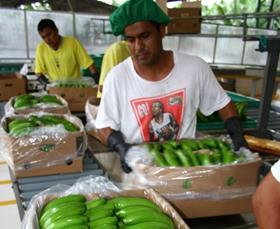
Ecuador’s banana industry is bracing itself for a challenging 2016, with the weakness of the Russian market, delays in signing a new agreement with the European Union and El Niño threatening to derail exports.
In comments to the national press, Eduardo Ledesma, executive director of exporter association AEBE said Ecuador could lose market share in the EU and US – two of its three biggest markets – in the coming year, while the economic situation in Russia also meant a likely fall in demand.
In spite of this, he said the sector was optimistic that new trade agreements with countries such as Turkey and South Korea would help to offset some of these losses and enable the industry to “at the very least maintain its export volume of around 320m boxes a year”.
Ledesma noted that the rapid devaluation of the rouble had restricted Russia’s purchasing power. The country sources 95 per cent of its bananas from Ecuador and is the Latin American country’s biggest individual market, absorbing 23 per cent of its total export volume.
“Russia has become slower in paying, but up to now it has always paid. As one of our most important buyers it is a market that we have to sustain and continue to develop,” Ledesma said.
In the year to September 2015, Russia bought 2.6 per cent fewer boxes of bananas than in the year-earlier period.
Ledesma also pointed out that Ecuador is likely to lose market share in the European Union this year because of delays in signing a Free Trade Agreement with the trading bloc. This has meant that Ecuadorean bananas are subject to a higher tariff than those from Colombia or Central America, both of which already have agreements with the EU in place which set out a gradual reduction in import duties.
In July 2014, after four years of negotiations Ecuador agreed to join the trade pact between Colombia and Peru and the EU, but it is not due to be ratified until the end of 2016 or early 2017. Under the terms of the agreement, bananas from Ecuador and Colombia will be subjected to the same tariff by 2020.
“Other exports, such as shrimp or flowers, are affected by the appreciation of the US dollar and the weakness of the Russian economy. But bananas face the added impact of the delays in negotiations with the EU as they have to pay more than their competitors to access this market,” economist Alberto Acosta-Burneo told AFP.
Ledesma added that Ecuador could also lose ground to Guatemala in the US, the third biggest market for Ecuadorean bananas behind the EU and Russia. “Guatemala is much closer and its sector is dominated by four producers who practically have a monopoly, so its prices are lower than ours,” he explained.
On the production side, AEBE warns that El Niño could bring heavy rains to the main growing regions, affecting 20-30 per cent of production in the worst case scenario.



